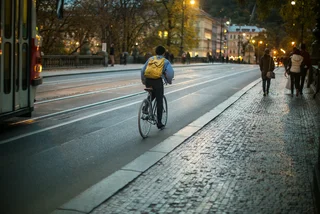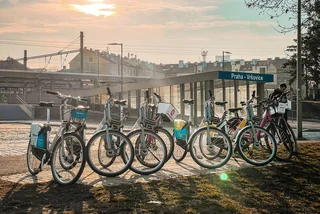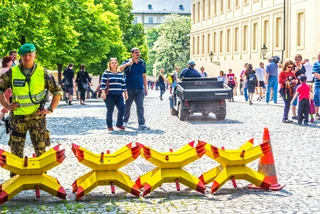While Prague residents' interest in cycling has been strengthening over the last couple of years, the city's infrastructure has much room for improvement.
According to the Global Bicycle Cities Index 2022, Prague was ranked 73rd among 90 cities, scoring 25.87 points out of 100. The closer a given metropolis is to 100, the better city it is for cyclists.
PARTNER ARTICLE
The ranking, compiled by the German insurance company Luko, lists major world cities such as New York, Sydney, and Shanghai, major European capitals, as well as cities that are known for improving their cycling infrastructure.
The order of the cities in the ranking is determined by 16 indicators, including, the number of cycling accidents and the number of shops with cycling supplies. However, the main indicators are investment and infrastructure quality, bicycle usage, bicycle sharing, and rental stations, road safety, weather, and educational events offered by a city.
One of the fastest growing cities in the Netherlands, Utrecht, was ranked the best city for cyclists. It is followed by Germany's Münster in second, and Belgium's Antwerp in third.
Meanwhile, Prague (73rd) was placed among such cities as Chicago (71st), Detroit (72nd), Istanbul (74th), and Cairo (75th).
The ranking reveals that Prague's support for cycling and investment in cycling infrastructure is not excessive, Prague Deputy Mayor Adam Scheinherr, responsible for transport, said.
"The opposition and other political parties running for City Hall have made bike lanes an election issue, but the data shows that there is no favoritism toward bicycles at the expense of other modes of transportation. Western metropolises are investing significantly more," Adam Scheinherr told Drbna.cz, commenting on the survey results.
At the same time, he noted that cycling in Prague has been gaining popularity in recent years. "In one election period, the number of cyclists in the capital doubled, we are investing record amounts in building new infrastructure, and we gave the citizens of Prague two free rides a day on shared bikes in addition to a long-term public transport coupon," he added.
Last month Prague extended the free shared bike program for another four years. People can use a shared bike for 15 minutes twice a day to complete their journeys from public transit stops.
The data also backs the increased interest in traveling by bicycle in Prague. The number of cyclists has increased by around 73 percent since 2019. Every second adult in Prague now rides a bike at least once a month.
A large proportion of people cycle more than once a week, and up to 120,000 Prague residents cycle several times a month. These figures are boosted by a growing number of electric bike and scooter users. Around half of cyclists cite environmental reasons for the switch, according to statistics cited by Prague City Hall. Other reasons include fun, fitness, and health.
Responding to the increased interest in cycling, the Czech parliament passed legislation last year aimed at ensuring traffic safety: drivers have to pass cyclists within a distance of 1.5 meters.
Despite Prague's low ranking, the city has allocated record investments in cycling infrastructure in 2022. Over the past three years, 17.7 kilometers of dedicated cycle lanes and 44.6 kilometers of protective lanes have appeared in Prague.
"According to data from bicycle counters, the number of passes in Prague almost doubled between 2019 and 2020. We are doing everything to maintain and develop this increase. In terms of sustainable mobility and the health of citizens, this is beneficial for everyone. Every cyclist means less crowded public transport, less car congestion in streets, and fewer emissions and noise," Scheinherr said.
In total, there are over 515 kilometers of marked routes in Prague, of which roughly 200 kilometers are separate from roads with cars.












 Reading time: 3 minutes
Reading time: 3 minutes 
































